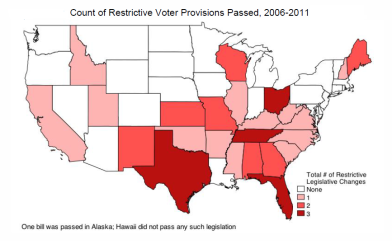Posts Tagged ‘voting rights’
Targeting the Right To Vote
 I’ve written about voting rights before, a topic that has become all the more urgent in the wake of recent efforts to restrict voting rights and the Supreme Court’s gutting of the Voting Rights Act. Keith Bentele and Erin O’Brien have a piece examining recent GOP efforts at adopting various voting barriers: Jim Crow 2.0? Why States Consider and Adopt Restrictive Voter Access Policies. (Full disclosure, Erin is a good friend from my doctoral program, and I provided feedback on the paper.) Their empirical findings are going to get the most attention, and they are certainly important. I’ll review them below. But the larger implications are important too, and since I fear these may get lost I want to discuss them more fully.
I’ve written about voting rights before, a topic that has become all the more urgent in the wake of recent efforts to restrict voting rights and the Supreme Court’s gutting of the Voting Rights Act. Keith Bentele and Erin O’Brien have a piece examining recent GOP efforts at adopting various voting barriers: Jim Crow 2.0? Why States Consider and Adopt Restrictive Voter Access Policies. (Full disclosure, Erin is a good friend from my doctoral program, and I provided feedback on the paper.) Their empirical findings are going to get the most attention, and they are certainly important. I’ll review them below. But the larger implications are important too, and since I fear these may get lost I want to discuss them more fully.
We ask so little of Democratic public officials: lowering the barriers to voting
While Republicans are sprinting to take away voting rights in the wake of Shelby (or doubling down, since they were already aggressively pushing voting barriers), you might think that Democrats would be doing the opposite. Sadly, not everyone has gotten the message that the Democrats are the party of lowering voting barriers. From the Oregonian:
Legislation aimed at adding hundreds of thousands of registered voters in Oregon failed by a single vote in the state Senate on Sunday.
Sen. Betsy Johnson, D-Scappoose, joined with all 14 Republicans to defeat a bill that would automatically register eligible voters when they received new or updated driver licenses in Oregon.
The Fundamental Principle of Popular Sovereignty…Good for One Day Only
At the end of the Supreme Court’s term last year, I noted that when it came to the Affordable Care Act case, every justice agreed with the principle that the Constitution creates a system of enumerated powers at the federal level. But, when it came to the Arizona’s punitive immigration law, those same nine justices all agreed the federal government was endowed with unenumerated powers, resulting from sovereignty, to regulate immigration.
As I said then, “both positions were consistent with past decisions”:
All this illustrates a point I’ve been trying to make–we have to distinguish between claims about what the Court does, from what it does, but both involve talk. Both are consequential, but neither are automatic. The key is not to ignore what the Court says or to take it as truth, but rather to focus on in what contexts certain things are taken for granted (and here we’re not just talking about the Court but also the larger legal community) and how it differs from other contexts.
This term brings a similar example, although this time it involves a smaller number of justices.
State are not Sovereign: The Supreme Court and Voting Rights
[Update: For a sense of legal landscape in the wake of the Supreme Court’s decision, read The Way Forward After Shelby County by Joey Fishkin]
The Supreme Court has struck down Section 4 of the Voting Rights Act (pdf), rendering Section 5 inoperable until Congress changes Section 4 (assuming Congress can and there is anything Congress could pass that the Supreme Court would allow, which is unclear). I addressed the most fundamental conservative objection to the Voting Rights Act after oral arguments – that it is a “racial entitlement”.
Generally speaking, you should just read Justice Ginsburg’s dissent, which righteously shreds Chief Justice Roberts’, and Jessica Mason Pieklo.
I wanted to address something a little more abstract.
Roberts’ opinion repeatedly references ‘state sovereignty’ as an (unenumerated) constitutional principle that supposedly overrides the enumerated power of Congress to enforce the 15th Amendment through appropriate legislation. Let’s leave aside the issue of enumeration, and of the case law (Ginsburg dispatched that handily). The bigger problem with this is that it’s absurd.
The Constitution makes clear that sovereignty is not vested in governments. It is vested in the people. Neither the states nor the federal government are sovereign. (Yes, don’t miss that second part – and let’s not pretend that a war settles constitutional questions either). From the opening words of the preamble of the original Constitution to it’s final clause, from the beginning to the end of the Bill of Rights, the basic, most fundamental constitutional principle is popular sovereignty. The entire process of ratification, by conventions rather than by state governments, only makes sense if you begin with popular sovereignty.
Literally every other principle we associate with American constitutionalism–separation of powers, federalism, enumerated powers–flows from this basic principle. Read the rest of this entry »
